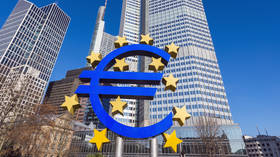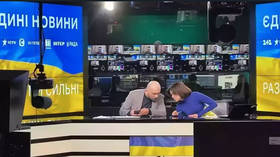ECB pressuring banks to leave Russia

The European Central Bank (ECB) has urged lenders to speed up their withdrawal from Russia due to increased risks of doing business in the sanctioned country, the Financial Times reported on Tuesday, citing top banking supervisor Claudia Buch.
Buch, who became chair of the ECB’s supervisory arm in January, told the outlet that her team is continuing to put pressure on European banks with operations in Russia to exit the country.
A number of foreign banks have left Russia in the past two years due to the West’s Ukraine-related sanctions. However, several lenders, including some from the Eurozone, continue to operate in the country. These include Raiffeisenbank and UniCredit Bank, which are subsidiaries of Austria’s Raiffeisen Bank International (RBI) and Italy’s UniCredit. Both play a crucial role in the Russian economy, enabling euro payments to and from the country. They are also the only foreign entities on the Russian central bank’s list of 13 systemically important credit institutions.
Dutch lender ING, Germany’s Commerzbank and Deutsche Bank, Hungary’s OTP Bank, Italy’s Intesa SanPaolo, and Sweden’s SEB also maintain a presence on the Russian market.
According to Buch, EU banks have slashed their activities by half since the beginning of the Ukraine conflict and those still present have been given “clear expectations on how we expect a downsizing of activities and exit strategies.”
She claimed that divesting activities in Russia would be “very prudent” amid “reputational” risks for banks being active in a country under international sanctions.
“And there are also issues related to the ability to control and manage risk in such a difficult environment,” Buch added.
The RBI Group, which owns Raiffeisen, has been resisting demands from the US and EU to speed up its exit from Russia. The Austrian lender announced plans last March to spin off its Russian business by September, following mounting pressure from Western governments.
However, in August, RBI Governor Johann Strobl said the company had postponed the process until the end of 2023. In September, the bank filed an application to register a new logo in Russia, saying it wanted to expand the capabilities of the trademark.
Meanwhile, earlier this month, Washington warned Austria’s banking giant that it risks “being cut off from the US financial system” if found to have helped fund Russia’s military, Reuters quoted the US Treasury Department as saying.
Raiffeisen has confirmed discussions with the US on potential sanctions for doing business in Russia but declined to provide further details, according to the EUobserver news website.
For more stories on economy & finance visit RT's business section












